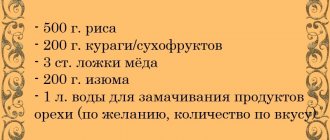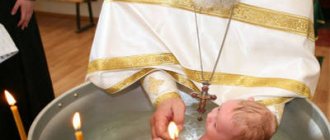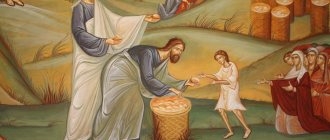History of the wedding sacrament
As we know from the Bible, and specifically from the books of the Old Testament, marriage appeared in paradise before the fall of the first people - Adam and Eve. And the Lord himself created marriage. As for the description of the marriage ceremony, it cannot be found in the Old Testament, but from some indirect quotes we can conclude that historically it consisted of two actions separated in time: betrothal (engagement) and, in fact, the wedding. This scheme was universal for both the Jews and the entire Greco-Roman world, and then, along with the spread of Christianity throughout the world, it came to other countries, including Rus'.
In the New Testament we also will not find a clear description of the rite of marriage. Nevertheless, it is known that the first Christians already had such a concept as “church marriage.” At the end of the 1st - beginning of the 2nd century, Ignatius the God-Bearer wrote in his Epistle to Polycarp that “those who marry should enter into a union with the consent of the bishop, so that the marriage will be about the Lord, and not out of lust. Let everything be for the glory of God.”
At the same time, a man and a woman who once accepted the Sacrament of Baptism and became members of the Christian community, and then entered into a church marriage, at the same time had to legalize their union before secular law. Christian apologetic literature, for example, the Epistle to Diognetus (about 200 after Christ), says that Christians “marry like everyone else.” The Epistle of Athenagoras (about 180 after the birth of Christ) states that “each of us has a wife, whom he married according to the laws established by us, for the purpose of procreation.”
The rite of Christian marriage began to take shape closer to the 4th century. For example, a tradition arose of inviting a bishop or priest to a wedding feast. The priest read a special prayer at a home holiday, thereby sanctifying the marriage of the newlyweds. The separation of family celebrations and church Sacraments occurred later. Special prayers for this Sacrament and rites appeared (a sequential, detailed presentation of any divine service).
Give young people guidance
It is the common duty of all of us as shepherds, and especially those who undertake engagements, to give young people healthy instruction from the Word of God so that they can create a beautiful and strong family and so that Christ can be seen by all people through the way they relate to each other. Therefore, if young people have not yet taken any course on preparing for marriage, they should be encouraged to take the course Marriage Without Regrets by Kay Arthur. Another, shorter version of the course is “One Day I Will Get Married”, and if there is very little time left before the wedding, you can take the “How to Create a Great Family” course with them, which contains 6 lessons of 40 minutes each. If you live in Moldova, you can buy all these books at the Christian bookstore “Instruction from the Word.” If you live in another country, contact the address and they will help you purchase them.
It would be a good idea to teach this course in the church you pastor every year, because this way all the youth can be prepared for marriage and will not have to rush through it when they decide to get married. In order to teach this course well and interestingly, I invite you to study the session “Counseling”, which is taught every year at the Institute of Inductive Bible Study in Moldova. This year it was already taught in September, and for 2016 it is planned from September 5-17. Until then, I invite you to study together the session “Church Growth” that I will teach from January 4-16, 2016 in Chisinau.
In the meantime, arrange for young people to study this course, for from it they will learn the fundamental truths without which the foundation of marriage cannot be laid, and without which they will not be able to experience the happiness that God has prepared for them in marriage. To conclude your course, plan...
Wedding ceremony
Betrothal (engagement)
Betrothal is an independent rite. It can be separated in time from the wedding. In practice, already in the 15th century it was usually performed together with the wedding. According to tradition, the betrothal takes place not in the temple itself, but in the vestibule - as a sign that the bride and groom have not yet become united in marriage.
The order of rites is as follows:
The priest carries the Holy Cross and the Gospel from the altar.
Then he blesses (baptizes) the bride and groom with the lit wedding candles, gives them into their hands, takes the censer and burns the censer. — Candles symbolize spiritual triumph, Divine grace that will remain in marriage, and the love that the hearts of the spouses will (should) burn towards each other. Cross-shaped incense means the invisible, mysterious presence of the grace of the Holy Spirit, who performs the holy Sacraments of the Church.
The priest loudly proclaims: “Blessed is our God...” - Every sacred ceremony begins with praise to God.
The peaceful litany (a series of petitions (requests) to God) is the same as at any other service.
Betrothal prayers - the basis of the betrothal ceremony - have been known since the end of the 8th century. In the first prayer (“Eternal God, who has gathered together in unity...”, the betrothal of Rebekah to Isaac is remembered and a blessing is asked for the betrothed. In the second (“Lord our God, from the tongue of the Lord we betrothed the Church to the pure virgin...”) a blessing is asked for the betrothal, peace and unanimity in life. future spouses.
Betrothal - The priest places the rings on the newlyweds and then switches their places. This happens three times. Historically, the husband was entitled to silver (early manuscripts usually speak of iron), and the wife – gold: a woman’s ring should cost more. There is no symbolism here, it just used to be a custom to give the bride or her family a marriage gift. If the gift was accepted, it was considered a guarantee of a future wedding.
Today, the exchange of rings has a symbolic meaning: it is a sign of an inextricable, eternal union between spouses. Before the betrothal, the rings are placed in the altar on the right side of the holy throne, as if in front of the face of the Lord Jesus Christ Himself. The rings are changed three times in honor and glory of the Most Holy Trinity, which accomplishes and approves everything (sometimes the priest himself changes the rings).
Concluding prayer - “Lord our God, who came to the youth of Patriarch Abraham in the midst, sending his master Isaac’s wife to warn him...” It asks for God's blessing on the betrothed couple.
A special litany (a series of petitions to God) is the same as at any service.
There is an assumption that in Byzantium church betrothal could be a sufficient form of marriage: in the manuscripts there are indications that after the betrothal the spouses could begin family life. In the manuscripts after the ceremony of betrothal there are the following words: “If they want (at the same time) to get married,” that is, “if they want (at the same time) to get married...”. And then comes the wedding.
11th Week after Pentecost
Matthew 24:13–28
2 Cor.4:1–6
From the Apostle Paul we read: “God, who commanded the light to shine out of darkness, has shone in our hearts to give the light of the knowledge of the glory of God in the face of Jesus Christ.” The apostles were called to bring this light “to all the earth,” because, according to the word of the Lord, before the end comes, the gospel of the kingdom must be preached “in all the world, as a testimony to all nations.”
But this light is closed “to those who are perishing, to those who do not believe, whose minds the god of this age (that is, the enemy of God, Satan) has blinded.” Satan, of course, cannot resist God. As soon as he thought about it, he was immediately cast out of heaven. But it’s a completely different matter when the human soul becomes the battlefield. Here Satan can also win, and not because he can really defeat God, but because the soul is free and can choose good or evil, light or darkness, God or the devil.
And while the soul has not made up its mind, God and the devil stand before it: God is trying to enlighten, and the devil is trying to blind and bring the person “alive into hell.” Lacking the truth, deprived even of power, the devil, in order to deceive, uses our passions, our natural desires, our habits, our laziness, and his servants from among ourselves. He scares, shows his imaginary strength, does everything to tie you to the world with inextricable bonds.
And the quiet light of Christ has a completely different effect on the soul. It does not press, does not break, does not burn. It shines quietly and meekly before the inner eyes of the soul. And the true evangelists of Christ approach the soul with the same care and respect: “We... without resorting to cunning, and without distorting the word of God, but by revealing the truth, present ourselves to the conscience of every person before God.”
But if the Lord is waiting for our conversion, then we ourselves have no time to wait. Who knows, maybe tomorrow “there will be the coming of the Son of Man.” And we need to have time not only to address, but also to understand many things. The Lord warned that “false Christs and false prophets will arise and show great signs and wonders to deceive, if possible, even the elect.” Therefore, we must learn to listen to our conscience. When Christ or His messenger appears, the soul is calm and joyful. And if there is doubt and confusion, then no matter how bright the visible light may be, you cannot open the door of the soul.
We must gradually loosen the shackles with which the world holds us. Because when the time comes, “let him who is on the housetop not go down to take anything from his house; and let him who is in the field not turn back to take his clothes.”
And we still have to understand what the “abomination of desolation” is, “standing in the holy place.” The abomination of desolation is obviously the disappearance from the earth of visible places where we come to meet the invisible God. And when this comes, “then if anyone says to you, “Behold, here is Christ”; “Behold, He is in the secret chambers,” do not believe.” Obviously, having once left its hidden places, the Church can no longer return there. Having become accessible to everyone: believers, those of little faith, and the superstitious, she can no longer leave them, draw a line within herself, and divide everyone into sheep and goats before the judgment of Christ. Here are our holy temples with everything that is in them, and there will be no others. Something about them is good, something is not so good, but probably when the abomination of desolation settles in them, it will be undoubted and obvious to everyone. Therefore, we must hasten to strengthen our spiritual vision, to be enlightened by “the knowledge of the glory of God in the face of Jesus Christ.” Otherwise, just as visible light, if it flashes suddenly, can deprive one of vision forever, so the suddenly arrived Day of the Lord can turn into eternal darkness.
Questions for the bride, groom and their parents
You will need to ask, in front of all people, the bride and groom if they are entering into a marriage for love and unconstrained by anyone. After each of them answers, you should ask the parents if they give their blessing to their marriage. Make sure that all guests who are also witnesses to this covenant hear the answer.
Sometimes young people prepare a written covenant that they want to read aloud to each other. In this case, you must read this covenant, and they must each repeat their part.
Wedding rings
Then the time has come when the wedding rings will be brought, and this is the appropriate moment to tell those who have been married, as well as all the guests, that these rings are not jewelry, but a token of the covenant they have made today, and they should always remember the promises they made today and the responsibilities God gave each of them in marriage. You can encourage all the guests in the room who are married to take another look at the rings and think carefully about how they are fulfilling the covenant of the marriage they entered into.
Why is a wedding necessary?
In the life of a Christian, God's blessing is of great importance. We pray in the morning, before going to bed, and on Sunday we dedicate the day to God by visiting temple. We take the blessing of the priest for every good deed. The death of a Christian is also associated with prayer . Moreover, believers want to receive God’s blessing for such an important event as marriage. After all, Orthodox Christians are chaste and want to have only one companion for life.
God's blessing for marriage is given in the Sacrament of Wedding, in which the priest reads prayers for mutual love and understanding of the spouses, for the gift of children. For a religious person, civil registration cannot be fully perceived as marriage. He needs the Sacrament to understand that a family has been created.
Message from the Bible
A sermon will follow, which you have prepared in advance, and which should be not only for the bride and groom, but also for everyone present at the wedding. Attention should not only be given to counsel and exhortation for the two before you, but instruction should be given from the Word to all people, and see that the Lord Jesus Christ is introduced and the fact that marriage was instituted by God and is a type of heavenly things. relationship between Christ and the Church. Preach using words that are simple and clear to all people. Do not forget that among their relatives there will be non-Christians, people who have not heard or know anything about God, and it is important that the message is so clear that they too understand it and can express it. At the end of the sermon, you will move directly to the wedding.











